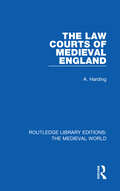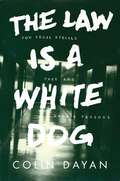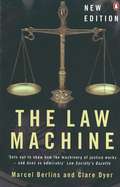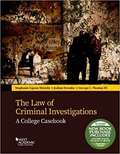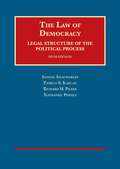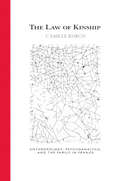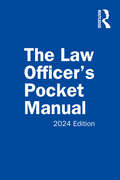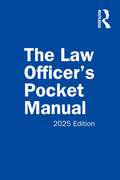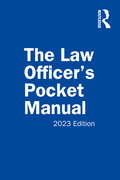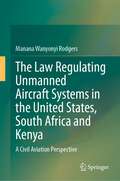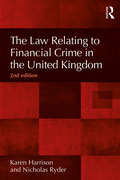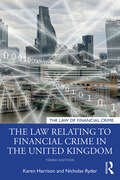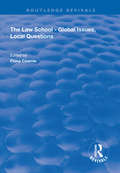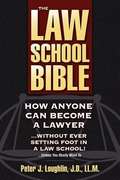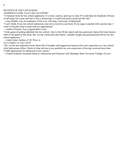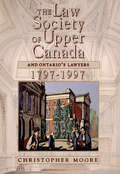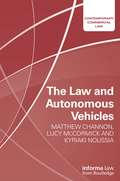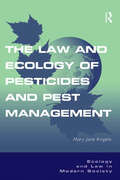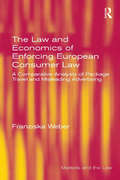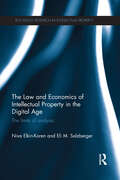- Table View
- List View
The Law Courts of Medieval England (Routledge Library Editions: The Medieval World #18)
by A. HardingOriginally published in 1973 The Law Courts of Medieval England looks at law courts as the most developed institutions existing in the medieval times. Communities crystallized upon them and the governments worked through them. This book describes the scope and procedures of the different courts, appointment of the judges, the beginnings of civil and criminal courts, the origin of the jury system and other aspects of the modern legal system. It is all shown by an analysis of actual reports of court cases of the time, giving a vivid picture of the life of the English people as well as of the ways of the professional lawyers, no less intricate than they are today.
The Law Is a White Dog: How Legal Rituals Make and Unmake Persons
by Colin DayanA fascinating account of how the law determines or dismantles identity and personhoodAbused dogs, prisoners tortured in Guantánamo and supermax facilities, or slaves killed by the state—all are deprived of personhood through legal acts. Such deprivations have recurred throughout history, and the law sustains these terrors and banishments even as it upholds the civil order. Examining such troubling cases, The Law Is a White Dog tackles key societal questions: How does the law construct our identities? How do its rules and sanctions make or unmake persons? And how do the supposedly rational claims of the law define marginal entities, both natural and supernatural, including ghosts, dogs, slaves, terrorist suspects, and felons? Reading the language, allusions, and symbols of legal discourse, and bridging distinctions between the human and nonhuman, Colin Dayan looks at how the law disfigures individuals and animals, and how slavery, punishment, and torture create unforeseen effects in our daily lives.Moving seamlessly across genres and disciplines, Dayan considers legal practices and spiritual beliefs from medieval England, the North American colonies, and the Caribbean that have survived in our legal discourse, and she explores the civil deaths of felons and slaves through lawful repression. Tracing the legacy of slavery in the United States in the structures of the contemporary American prison system and in the administrative detention of ghostly supermax facilities, she also demonstrates how contemporary jurisprudence regarding cruel and unusual punishment prepared the way for abuses in Abu Ghraib and Guantánamo.Using conventional historical and legal sources to answer unconventional questions, The Law Is a White Dog illuminates stark truths about civil society's ability to marginalize, exclude, and dehumanize.
The Law Machine
by Clare Dyer Marcel BerlinsThe authors explain and discuss how the justice system evolved, the way it operates - including vivid descriptions of the trial process - and how lawyers work. Revised and updated throughout for this fifth edition, THE LAW MACHINE surveys recent developments in the workings of justice and the outlook for the future. 'Refreshingly free of the patronizing attitude and the humbug with which other books about the legal system are riddled' - THES
The Law Of Criminal Investigations: A College Casebook (Higher Education Coursebook)
by Joshua Dressler Stephanie Mizrahi George Thomas IIIThis newly designed casebook provides the perfect balance between the challenges of the case method and the needs of undergraduate and graduate students who may, or may not, be headed to law school. The Law of Criminal Investigations: A College Casebook makes use of many of your favorite U.S. Supreme Court cases; edited to reflect the needs of undergraduate students, with Notes and Questions that help illuminate the case and show how it works in the real world. Also included are narratives and summaries that explain and synthesize some of the more complicated legal nuances found in the world of criminal procedure. Written by renowned law professors and authors, Joshua Dressler and George Thomas, who are now joined by Dr. Stephanie Lipson Mizrahi, this book will appeal to all criminal procedure teachers who want to offer their students more in-depth coverage and analysis of this important topic.
The Law Of Democracy: Legal Structure Of The Political Process
by Samuel Issacharoff Pamela Karlan Richard Pildes Nathan PersilyThis book created the field of the law of democracy, offering a systematic account of the legal construction of American democracy. This edition is the most significant revision in a decade. With the addition of Nathaniel Persily, the book now turns to a changed legal environment following such blockbuster Supreme Court decisions as Citizens United and Shelby County. This edition streamlines the coverage of the Voting Rights Act, expands the scope of coverage of campaign finance and political corruption issues, and turns to the new dispute over voter access to the ballot. The basic structure of the book continues to follow the historical development of the individual right to vote; current struggles over gerrymandering; the relationship of the state to political parties; the constitutional and policy issues surrounding campaign-finance reform; and the tension between majority rule and fair representation of minorities in democratic bodies.
The Law Of Disability Discrimination For Higher Educational Professionals
by Ruth Colker Paul GrossmanThe purpose of The Law of Disability Discrimination for Higher Education Professionals is to provide an in-depth understanding of the ADA and related statutes to the many individuals who are responsible for disability equality in higher education: disabled student services directors, ADA officers, house and contract counsel, human resource directors, college grievances officers, ombudspersons, federal and state compliance agents, organizational advocates, health and counseling service personnel, deans and faculty, etc.
The Law Of Kinship
by Camille RobcisIn France as elsewhere in recent years, legislative debates over single-parent households, same-sex unions, new reproductive technologies, transsexuality, and other challenges to long-held assumptions about the structure of family and kinship relations have been deeply divisive. What strikes many as uniquely French, however, is the extent to which many of these discussions-whether in legislative chambers, courtrooms, or the mass media-have been conducted in the frequently abstract vocabularies of anthropology and psychoanalysis. In this highly original book, Camille Robcis seeks to explain why and how academic discourses on kinship have intersected and overlapped with political debates on the family-and on the nature of French republicanism itself. She focuses on the theories of Claude Levi-Strauss and Jacques Lacan, both of whom highlighted the interdependence of the sexual and the social by positing a direct correlation between kinship and socialization. Robcis traces how their ideas gained recognition not only from French social scientists but also from legislators and politicians who relied on some of the most obscure and difficult concepts of structuralism to enact a series of laws concerning the family. Levi-Strauss and Lacan constructed the heterosexual family as a universal trope for social and psychic integration, and this understanding of the family at the root of intersubjectivity coincided with the role that the family has played in modern French law and public policy. The Law of Kinship contributes to larger conversations about the particularities of French political culture, the nature of sexual difference, and the problem of reading and interpretation in intellectual history.
The Law Officer's Pocket Manual: 2024 Edition
by John G. Miles Jr. David B. Richardson Anthony E. ScudellariThe Law Officer’s Pocket Manual is a handy, pocket-sized, spiral-bound manual that highlights basic legal rules for quick reference and offers examples showing how those rules are applied. The manual provides concise guidance based on U.S. Supreme Court rulings on constitutional law issues and other legal developments, covering arrest, search, surveillance, and other routine as well as sensitive areas of law enforcement. It includes more than 100 examples drawn from leading cases to provide guidance on how to act in a wide variety of situations. The 2023 edition is completely updated to reflect recent court decisions. This book helps you keep track of everything in a readable and easy-to-carry format. Routledge offers tiered discounts on bulk orders of 5 or more copies: For more information, please visit: https://www.routledge.com/collections/16268
The Law Officer's Pocket Manual: 2025 Edition
by John G. Miles Jr. David B. Richardson Anthony E. ScudellariPrepared by Patrick J. Sobkowski, J.D.The Law Officer’s Pocket Manual is a handy, pocket-sized, spiral-bound manual that highlights basic legal rules for quick reference and offers examples showing how those rules are applied. The manual provides concise guidance based on U.S. Supreme Court rulings on constitutional law issues and other legal developments, covering arrest, search, surveillance, and other routine as well as sensitive areas of law enforcement. It includes more than 100 examples drawn from leading cases to provide guidance on how to act in a wide variety of situations. The 2025 edition is completely updated to reflect recent court decisions. This book helps you keep track of everything in a readable and easy-to-carry format.Routledge offers tiered discounts on bulk orders of 5 or more copies: For more information and to learn about other Books for Law Enforcement Professionals, please visit: https://www.routledge.com/collections/16268
The Law Officer’s Pocket Manual, 2023 Edition
by John G. Miles Jr. David B. Richardson Anthony E. ScudellariThe Law Officer’s Pocket Manual is a handy, pocket-sized, spiral-bound manual that highlights basic legal rules for quick reference and offers examples showing how those rules are applied. The manual provides concise guidance based on U.S. Supreme Court rulings on constitutional law issues and other legal developments, covering arrest, search, surveillance, and other routine as well as sensitive areas of law enforcement. It includes more than 100 examples drawn from leading cases to provide guidance on how to act in a wide variety of situations. The 2023 edition is completely updated to reflect recent court decisions. This book helps you keep track of everything in a readable and easy-to-carry format. Routledge offers tiered discounts on bulk orders of 5 or more copies: For more information, please visit: https://www.routledge.com/collections/16268
The Law Regulating Unmanned Aircraft Systems in the United States, South Africa and Kenya: A Civil Aviation Perspective
by Manana Wanyonyi RodgersThis book evaluates how the legal, institutional and policy frameworks for Unmanned Aircraft Systems (UAS) in the United States, South Africa and Kenya have addressed the current needs and challenges involved in these systems’ operation and integration into regulatory frameworks for civil aviation. It shows how the three states have developed their own constitutional frameworks, legislation, regulations, policies and strategic plans to address the challenges that emanate from integrating UAS into the civil aviation airspace.The book details the three countries’ integration experiences, investigating the extent to which existing international regulatory frameworks address the various concerns, and identifies the common thread that runs through UAS regulation, as well as each country’s unique issues and path to integration. Recognizing that the approach for integration of UAS into civil aviation needs to be gradual and pragmatic, the book recommends scaling up institutional capacity, coordination and funding, and intensifying regional efforts to redefine and support UAS integration.
The Law Relating to Financial Crime in the United Kingdom (The Law of Financial Crime)
by Nicholas Ryder Karen HarrisonOutlining the different types of financial crime and their impact, this book is a user-friendly, up-to-date guide to the regulatory processes, systems and legislation which exist in the UK. Each chapter has a similar structure and covers individual financial crimes including money laundering, terrorist financing, fraud, insider dealing, market abuse, bribery and corruption and finally tax avoidance and evasion. Offences are summarized and their extent is evaluated using national and international documents. Detailed assessments of financial institutions and regulatory bodies are made and the achievements of these institutions are analysed. Sentencing and policy options for different financial crimes are included and suggestions are made as to how criminal proceeds might be recovered. This second edition has been fully updated and includes a section on cybercrime and a new chapter on tax evasion. Case summaries have also been included in those chapters where a criminal justice route is used by the prosecuting authorities.
The Law Relating to Financial Crime in the United Kingdom (The Law of Financial Crime)
by Nicholas Ryder Karen HarrisonOutlining the different types of financial crime and their impact, this book is a user-friendly, up-to-date guide to the regulatory processes, systems and legislation which exist in the UK. Each chapter has a similar structure and covers individual financial crimes including money laundering, terrorist financing, fraud, insider dealing, market abuse, bribery and corruption and finally tax avoidance and evasion. Offences are summarized and their extent is evaluated using national and international documents. Detailed assessments of financial institutions and regulatory bodies are made and the achievements of these institutions are analysed. Sentencing and policy options for different financial crimes are included and suggestions are made as to how criminal proceeds might be recovered. This third edition has been fully updated and includes a new chapter on corporate financial crime.
The Law School - Global Issues, Local Questions: Global Issues, Local Questions (Routledge Revivals)
by Fiona CownieFirst published in 1999, this international collection of essays on legal education addresses the following issues: The Law School and the University. Research into legal education has often been regarded as a marginal activity as compared with research into substantive areas of law. However, recent years have seen a growing interest in discussions about the purpose of the university law school and the ways in which law is taught within it. Are we educating professional lawyers or legal scholars? What do we really mean when we say we want to offer ‘a liberal education in the law’? What effect are the current changes in higher education funding and policy having on law schools and what takes place within them? The international group of scholars who have contributed to this collection come from very different jurisdictions, but they have written about topics which, while they have local resonances, are of concern globally. Global Issues, Local Questions addresses matters which concern all law teachers, whatever their field of substantive legal expertise.
The Law School Bible: How Anyone Can Become a Lawyer... Without Ever Setting Foot in a Law School! ... Unless You Really Want To
by Peter J. LoughlinThe Law School Bible is for anyone who aspires to become a lawyer, but cannot pursue a traditional law school education.
The Law School Decision Game: A Playbook for Prospective Lawyers
by Ann K. LevineWhether you’re considering law school or are already committed, "The Law School Decision Game: A Playbook for Prospective Lawyers" explains your choice to enter the legal profession with the candor readers have come to expect from Ann Levine's Law School Expert blog including: <p><p>•What lawyers do, how much money they make, and how hard they work. <p>•What’s important in choosing a law school. <p>•What BigLaw is really like.•What to consider before taking on student loan debt in today's job market. <p>•What you can do now to increase your likelihood of getting hired later. <p>•What is important in choosing an area of specialization. <p>•What you need to know and do in law school and in the first few years of your career to set yourself up for success.
The Law Society of Upper Canada and Ontario's Lawyers, 1797-1997
by Christopher MooreAt the end of the eighteenth century, when ten lawyers gathered in what is now Niagara-on-the-Lake to form the Law Society of Upper Canada, they were creating something new in the world: a professional organization with statutory authority to control its membership and govern its own affairs. Today's Law Society of Upper Canada, with more than 25,000 members, still wields these powers. Marking the bicentennial of the society's foundation, Christopher Moore's history begins by exploring the unprecedented step taken in 1797 and follows the evolution of lawyers' work and the idea of professional autonomy through two hundred years of growth and change.The Law Society of Upper Canada and Ontario's Lawyers is a broad-ranging story of the growth and development of the Law Society and the legal profession, from the days when horseback barristers travelled the backwoods by horseback, through the reforms of the late nineteenth century to the period of reaction between the two world wars and the long struggle of women and minorities for access to and equity in the legal profession. Writing in a style that is scholarly as well as entertaining, Moore traces to the present a story rich in personalities, and shows how, after a period of tremendous growth and change, questions of governance, legal aid, and practice insurance triggered a series of crises that rocked the society to its foundations.This is the first study to be based on full access to the society's two hundred years of historical records. Moore, who has organized his research into themes and periods to illuminate the story, also includes new material on the lives and careers of Ontario lawyers and on the place of the Law Society in professional and public life. Readable and extensively illustrated, The Law Society of Upper Canada and Ontario's Lawyers shows that such issues as professional autonomy and the internal organization, at the forefront of debate at the society's inception, continue to dominiate discussions today.
The Law and Autonomous Vehicles (Contemporary Commercial Law)
by Kyriaki Noussia Matthew Channon Lucy McCormickWhen will we see autonomous vehicles on our roads? The answer is that to some degree, they are already here. Numerous organisations are testing fully autonomous prototypes on public roads in the UK, and even commercially available vehicles already have several ‘quasi-autonomous’ features. KPMG has forecasted that the connected and autonomous vehicles market could be worth as much as £51 billion to the British economy by 2030 and could create some 30,000 new jobs over the same period. Accordingly, the UK and a number of other jurisdictions are already implementing legal reforms with a view to smoothing the path for this technology. Notably, Parliament has passed the Automated and Electric Vehicles Act 2018 dealing with the insurance of such vehicles, and changes are currently being made to the Road Vehicle (Construction and Use) Regulations 1986 and to the Highway Code to accommodate highly automated technologies. The government has also issued non-statutory guidance in relation to testing on public roads, and in relation to vehicle cybersecurity. Against this rapidly changing landscape, this book analyses the key legal issues facing autonomous vehicles, including testing on public roads, insurance, product liability, and cyber security and data protection. It also examines the approach being taken in other jurisdictions, including Austria, Germany, Greece, Italy, the USA, and South Africa.
The Law and Business of International Project Finance
by Scott L. HoffmanThis 2007 third edition continues to be a comprehensive and authoritative guide to the business, practice, law, and practical use of project finance. It covers the complete project finance structure, from conception to negotiation to debt closing, and from project difficulties to successful restructuring. The book continues to be accessible to those with little experience in project finance, while maintaining the insight and detail of previous editions that has made it a valuable reference for the experienced lawyer, manager, banker, contractor, and government official. This edition focuses on a real-world, practical approach to project finance, without the overuse of case studies and economic theory. Yet the contract forms, detailed glossary, index, and project finance bibliography make it a complete text.
The Law and Consumer Credit Information in the European Community: The Regulation of Credit Information Systems
by Federico FerrettiConsumer credit information systems are the tools used by the majority of lenders to manage credit risk, with lenders accessing credit reference databases managed by third party providers to evaluate a consumer‘s credit application. So far, the subject of consumer credit reporting has been left to the predominant attention of the economic and busin
The Law and Ecology of Pesticides and Pest Management (Ecology And Law In Modern Society Ser.)
by Mary Jane AngeloAlthough concerns over the ecological impacts of pesticides gave rise to the environmental movement of the late 1960s and 1970s, since that time, pesticide use and its effects have been largely ignored by the law and by legal scholars. This book addresses this omission by providing a unique and serious treatment of the significance of pesticide issues in environmental law and takes an ecological perspective on the legal issues. Dealing with a wide range of questions relating to pests and pesticides, the book focuses primarily on agricultural pesticide use as the largest contaminator in the US. It also examines the legacy of past pesticide use and analyzes how recent developments in ecological science can inform the law and increase our understanding of ecology. Interdisciplinary in its approach, the book will be of interest to academics, lawyers, scientists and environmental and agricultural professionals.
The Law and Economics of Enforcing European Consumer Law: A Comparative Analysis of Package Travel and Misleading Advertising (Markets and the Law)
by Franziska WeberIn the internet age, the need for effective consumer law enforcement has arguably never been greater. This timely book is a comparative law and economic analysis of the changing landscape of EU consumer law enforcement policy. EU member states are moving away from purely public or private law enforcement and now appear to be moving towards a more mixed approach, not least due to European legislation. This book reflects on the need for and creation of efficient enforcement designs. It examines the various economic factors according to which the efficiency of different enforcement mechanisms can be assessed. Hypothetical case scenarios within package travel and misleading advertising, dealing with substantial individual harm and trifling and widespread harm are used to illustrate various consumer law problems. Design suggestions on how to optimally mix enforcement mechanisms for these case scenarios are developed. The findings are then used as a benchmark to assess real life situations in countries with different enforcement traditions - the Netherlands, Sweden and England. The book is of value to both researchers and policy-makers working in the area of consumer protection.
The Law and Economics of Framework Agreements
by Albano, Gian Luigi and Nicholas, Caroline Gian Luigi Albano Caroline NicholasFramework agreements have arisen in response to the well documented and high costs of public procurement procedures. The agreements have significant potential to improve procedural efficiency in public procurement, but are complex to operate. Inadequate preparation and implementation can also frustrate their potential both to tackle waste, abuse and corruption and to enhance value for money. In this enlightening book, Gian Luigi Albano and Caroline Nicholas look at the key decisions required for designing and using framework agreements and address both legal and economic issues to give the reader a clear understanding of the planning, variables and flexibility needed for efficient implementation. This book will be of interest to policy makers, lawyers and public procurement practitioners who want to deepen their understanding of the legal and economic issues surrounding framework agreements.
The Law and Economics of Intellectual Property in the Digital Age: The Limits of Analysis (Routledge Research in Intellectual Property)
by Niva Elkin-Koren Eli SalzbergerThis book explores the economic analysis of intellectual property law, with a special emphasis on the Law and Economics of informational goods in light of the past decade’s technological revolution. In recent years there has been massive growth in the Law and Economics literature focusing on intellectual property, on both normative and positive levels of analysis. The economic approach to intellectual property is often described as a monolithic, coherent approach that may differ only as it is applied to a particular case. Yet the growing literature of Law and Economics in intellectual property does not speak in one voice. The economic discourse used in legal scholarship and in policy-making encompasses several strands, each reflecting a fundamentally different approach to the economics of informational works, and each grounded in a different ideology or methodological paradigm. This book delineates the various economic approaches taken and analyzes their tenets. It maps the fundamental concepts and the theoretical foundation of current economic analysis of intellectual property law, in order to fully understand the ramifications of using economic analysis of law in policy making. In so doing, one begins to appreciate the limitations of the current frameworks in confronting the challenges of the information revolution. The book addresses the fundamental adjustments in the methodology and underlying assumptions that must be employed in order for the economic approach to remain a useful analytical framework for addressing IPR in the information age.
The Law and Economics of a Sustainable Energy Trade Agreement
by Ricardo Meléndez-Ortiz Richard Samans Gary C. HufbauerThe widely accepted need to reduce the world's dependence on fossil fuels and move instead to low-carbon, renewable alternatives faces a host of challenges. Whilst the greatest challenges remain in engineering, political and public policy issues continue to play a very important role. This volume, which consists of contributions from leading figures in the field, presents the case for a Sustainable Energy Trade Agreement (SETA). It shows that by addressing barriers to trade in goods and services relevant for the supply of clean energy, such an agreement would foster the crucial scaling-up of clean energy supply and promote a shift away from fossil fuels. In doing so it illustrates how the agreement would help to address a number of overarching sustainable development priorities, including the urgent threat of climate change, enhanced energy access and improved energy security. The book will appeal to academics and policymakers working on the interface of trade and energy policy. Proposes a new trade agreement that will appeal to those who understand the potential of trade to contribute to sustainable development and wish to see progress. Provides a concrete positive contribution to climate action, which contrary to other climate policies comes at a low cost, with benefits for all involved. Provides rich and groundbreaking analysis, with leading experts developing their ideas in an accessible manner.
